Publications
For submission of articles or Working Papers to CEsA, please send an email to:
comunicacao@cesa.iseg.ulisboa.pt
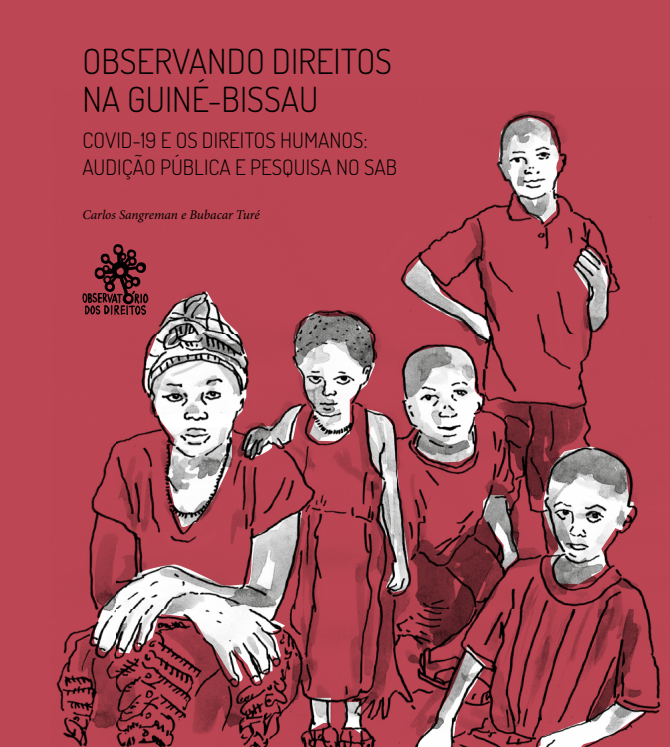
Observando direitos na Guiné-Bissau: Covid-19 e os direitos humanos: audição pública e pesquisa no SAB
Abstract:
Observando Direitos na Guiné-Bissau – Covid-19 e os Direitos Humanos: audição pública e pesquisa no SAB intends to investigate the human rights situation during the Covid-19 pandemic in Guiné-Bissau between January 2020 and January 2022. The framework is based on documentary research on human rights in sub-Saharan Africa from the production of international and specialized organizations, and other non-governmental human rights defenders of the same period. For Guiné-Bissau, in addition to equal research, the communiqués and official bulletins of the “Hight commissariat for Covid-19” were also collected with the information of infected, hospitalized, recovered, deaths and vaccinations, as well as interviews with the newspapers of the Commissioner and the Secretary. With the concentration of cases in the capital, Bissau, the research organize a survey of families, of market sellers and of companies on the effects of the pandemic and the measures enacted by the Government/Presidency to contain. A public hearing was also organized in the House of Rights, with various entities ranging from the High Commissariat to Unions, journalists, and public order police to information about how each institution through its situation and action in this period. As conclusions of the analyses of all these qualitative and quantitative data, it is possible to affirm that Guinea-Bissau’s fragility has such a weight in Guinean society that a disease that has killed fewer people in the country than malaria, diarrhea or tuberculosis has not overlapped with problems arising in poverty and low incomes in general. It affected Human Rights by showing that it was already knew about the enormous shortcomings of the health system, but the effects were more graves on economic and social rights by the abrupt stagnation of economic international activity, the cooperation project, unemployment, and the rise of poverty than directly by the pandemic and measures adopted. The human rights of first generation, more political, freedom of the press and demonstration were affected, with arbitrary arrests and violence practiced by unidentified individuals intensifying the climate of impunity and feeling that the regime is becoming increasingly repressive, but it cannot be said that they were effects directly arising from the pandemic.
Quotation:
Sangreman, C., Turé, B. (2022). Observando Direitos na Guiné-Bissau – Covid-19 e os Direitos Humanos: audição pública e pesquisa no SAB. pag.93. Lisboa: ACEP, com LGDH e CEsA. ISBN 978-9898625-27-4
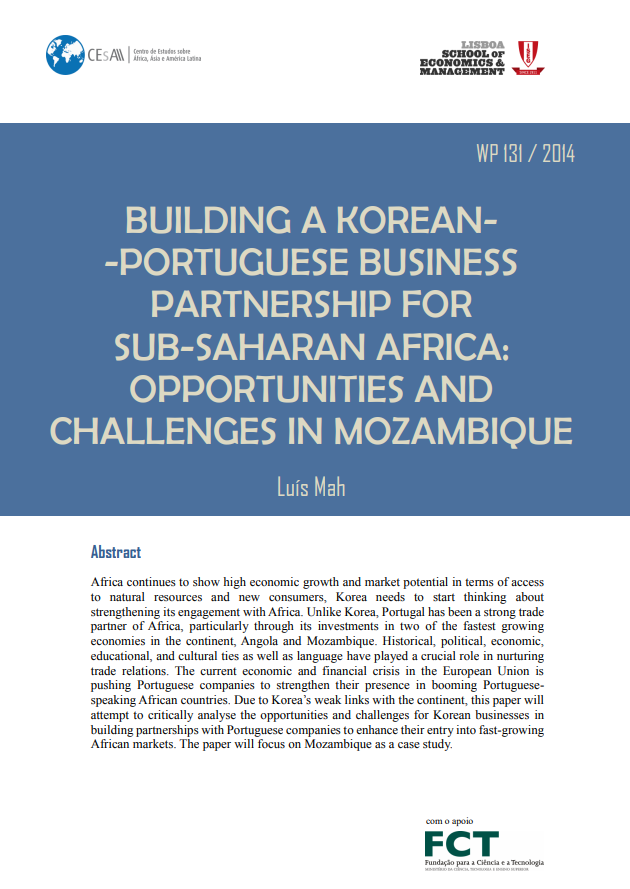
Working Paper 131/2014: Building a Korean-Portuguese business partnership for sub-saharan Africa: opportunities and challenges in Mozambique
Abstract:
Africa continues to show high economic growth and market potential in terms of access to natural resources and new consumers, Korea needs to start thinking about strengthening its engagement with Africa. Unlike the case of Korea, Portugal has been a strong trade partner of Africa, particularly through its investments in two of the fastest growing economies in the continent, Angola and Mozambique. Historical, political, economic, educational, and cultural ties as well as language have played a crucial role in nurturing the trade relations. The current economic and financial crisis in the European Union is pushing Portuguese companies to strengthen their presence in booming Portuguese- speaking (lusophone) African countries. Due to Korea’s weak links and connections with the continent, Building a Korean-Portuguese business partnership for sub-saharan Africa : opportunities and challenges in mozambique will attempt to critically analyse the opportunities and challenges for Korean businesses in building partnerships with Portuguese companies to enhance their entry into African markets that are growing fastly. The paper will focus on Mozambique as a case study.
Quotation:
Mah, Luís (2014). “Building a Korean-Portuguese business partnership for sub-saharan Africa : opportunities and challenges in mozambique”. Instituto Superior de Economia e Gestão – CEsA Documentos de Trabalho nº 131-2014
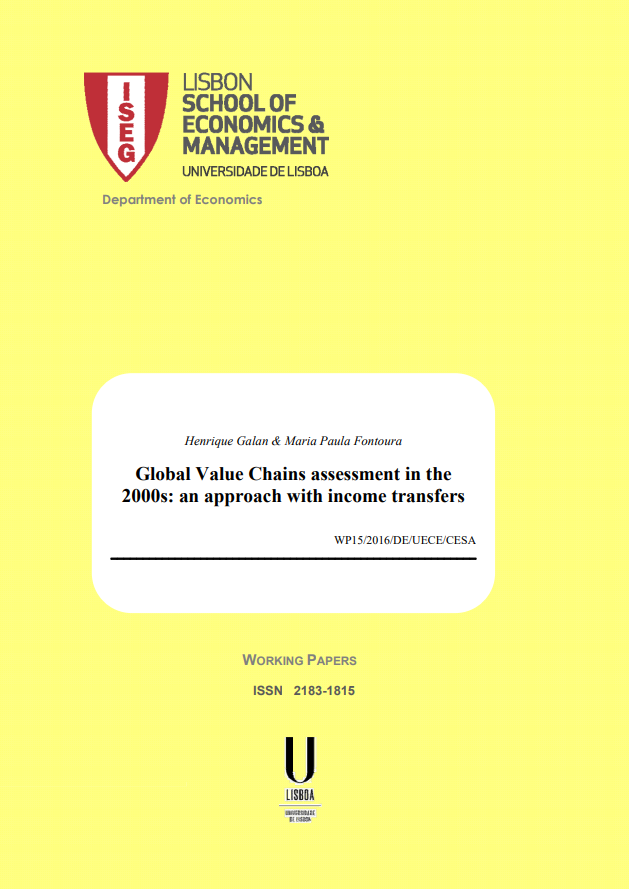
Working Paper 15/2016/DE/UECE/CEsA: Global value chains assessment in the 2000s: an approach with income transfers
Abstract:
In Global value chains assessment in the 2000s: an approach with income transfers, we make use of recent data published by the World Input-Output Database to (i) measure the degree of total and net “transferred” gains of major Organization for Economic Co-operation and Development (OECD)-member countries and emerging economies by being part of a Global Value Chain (GVC) with two incomerelated indicators built for this purpose and (ii) capture whether the bilateral degree of GVC insertion of this group of countries, measured with the proposed indicators, contributes to Foreign Direct Investment (FDI) inflows in the 2000s. The pooled regression model estimated shows that bilateral FDI inflows, controlling for other possible FDI determinants, are positively associated to the total “transferred” income generated by GVC-induced bilateral trade of inputs, taken as a proxy to the degree of GVC-embeddedness of those countries, while correlation with GVC-associated net gains was not confirmed. The regression also shows the negative impact of the global financial crisis of 2008-9 and the significant role played by the People’s Republic of China on FDI inflows.
Quotation:
Martínez-Galán, Enrique e Maria Paula Fontoura .2016.“Global value chains assessment in the 2000s: an approach with income transfers”. Instituto Superior de Economia e Gestão. DE Working papers nº 15-2016/DE/UECE/CEsA.
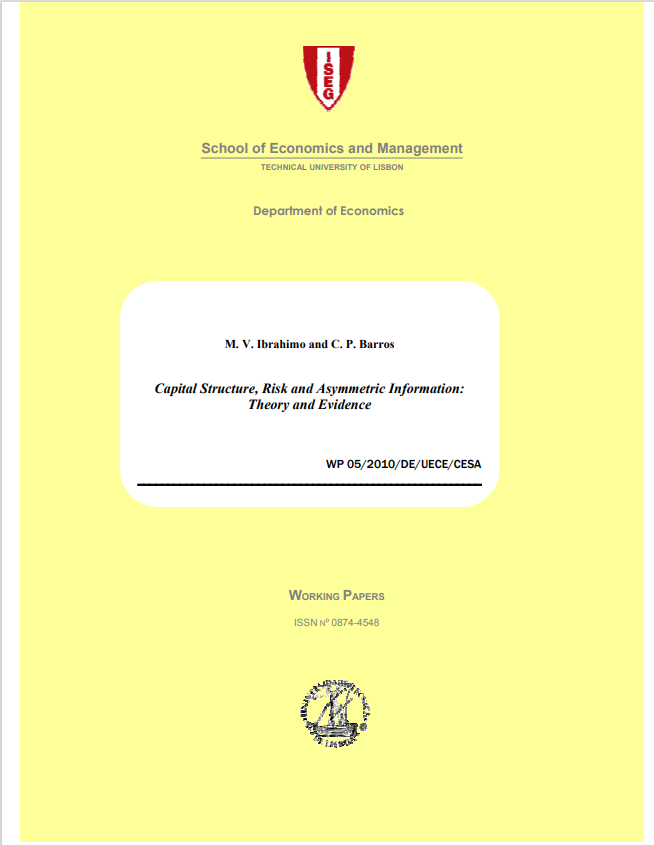
Working Paper 5/2010/DE/UECE/CESA: Capital structure, risk and asymmetric information: theory and evidence
Abstract:
Capital structure, risk and asymmetric information: theory and evidence proposes a principal-agent model between banks and firms with risk and asymmetric information. A mixed form of financing to firms is assumed. The capital structure of firms is a relevant cause for the final aggregate level of investment in the economy. In the analysed model, there may be a separation equilibrium, which is not economically efficient as aggregate investments fall short of the first-best level. Based on data at the level of European firms, an empirical model is presented that validates the result of the relevance of firms’ capital structure. The relative magnitude of equity in capital structure makes a real difference to the profits earned by firms in the economy. In both theoretical and empirical analyses, many scholars have addressed the reflections on the capital structure mix that could explain healthy functioning of firms in free market economies. In the current climate of global economic crisis, interest in this issue has again assumed vital relevance.
Quotation:
Ibrahimo, M.V. e Carlos Pestana Barros (2010). “Capital structure, risk and asymmetric information: theory and evidence”. Instituto Superior de Economia e Gestão – DE Working papers nº 05/2010/DE/UECE/CESA (Centro de Estudos sobre África e Desenvolvimento
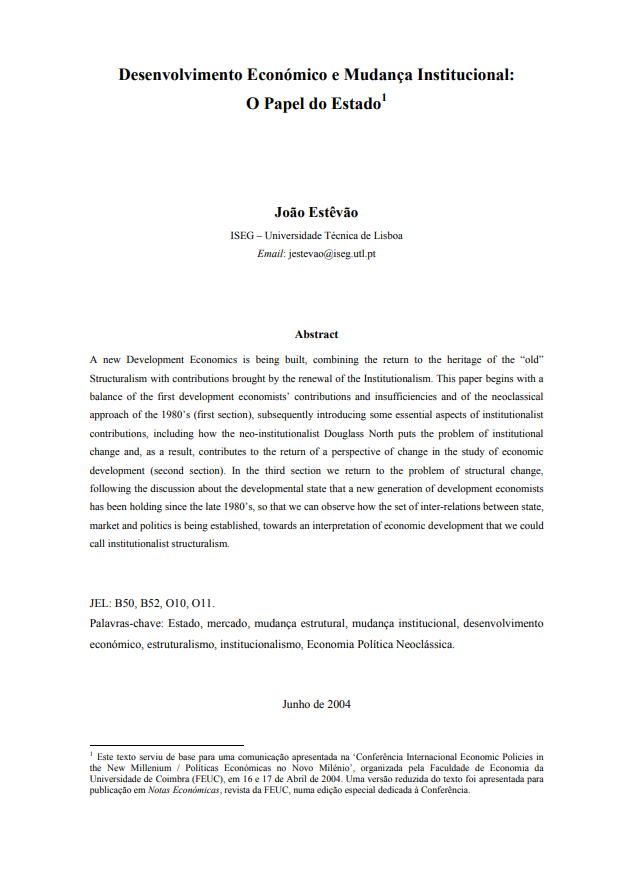
Working Paper 8/DE/CEsA/2004: Desenvolvimento económico e mudança institucional: o papel do Estado
Abstract:
A new Development Economics is being built, combining the return to the heritage of the “old” Structuralism with contributions brought by the renewal of the Institutionalism. Desenvolvimento económico e mudança institucional: o papel do Estado begins with a balance of the first development economists’ contributions and insufficiencies and of the neoclassical approach of the 1980’s (first section), subsequently introducing some essential aspects of institutionalist contributions, including how the neo-institutionalist Douglass North puts the problem of institutional change and, as a result, contributes to the return of a perspective of change in the study of economic development (second section). In the third section we return to the problem of structural change, following the discussion about the developmental state that a new generation of development economists has been holding since the late 1980’s, so that we can observe how the set of inter-relations between state, market and politics is being established, towards an interpretation of economic development that we could call institutionalist structuralism. This paper makes a very brief presentation of aspects of a reflection that I have been developing on the evolution of development economics, with the main objective of understanding the essential characteristics of the renewal that a new generation of development economists has been carrying out since the late 1980s. Since then, a relative rapprochement between theoretical developments that recovered essential aspects of the “old” structuralism tradition and developments that took up the tradition found in the writings of the “old” institutionalism became noticeable. The important question is to understand how the new institutionalist research programme helps to improve the understanding of structural change and thus of the development process as a whole.
Quotation:
Estevão, João (2004). “Desenvolvimento económico e mudança institucional: o papel do Estado”. Instituto Superior de Economia e Gestão – DE Working papers nº 08/2004/DE/CEsA.
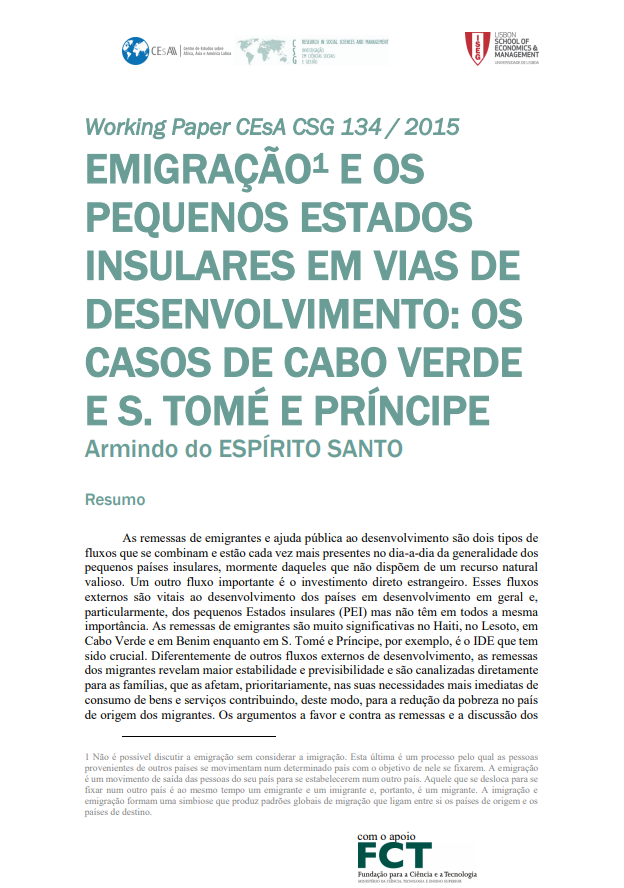
Working Paper 134/2015: Emigração e os pequenos estados insulares em vias de desenvolvimento: os casos de Cabo Verde e S. Tomé e Príncipe
Abstract:
Workers’ remittances and official development assistance are two types of flows that combine and are increasingly present in the day by day of most small island states, especially those that do not have a valuable natural resource. Another important flow is the foreign direct investment. These flows are vital to the development of developing countries in general and particularly of Small Island States (SIS), but do not have in all the same importance. Remittances of emigrants are very significant in Haiti, Lesotho, Cape Verde and Benin while in S. Tome and Principe, for example, it is the FDI that has been crucial. Differently from other external development flows, remittances from migrants reveal greater stability and predictability and are channeled directly to the families, that affect them primarily in their most immediate needs of consumer goods and services contributing thus to reduce poverty in the country of origin of migrants. The arguments for and against the remittances and the discussion of the effects of remittances on economic growth have contributed to stress the importance of remittances in small developing countries. But in certain SIDS, a significant proportion of migrants in the total population have produced remittances relatively small or negligible, so there seems to be here cultural reasons, in addition to economic one, influencing minor sending remittances, as in the case of São Tomé and Principe. Emigração e os pequenos estados insulares em vias de desenvolvimento : os casos de Cabo Verde e S. Tomé e Príncipe shows that the economy of Cape Verde is dependent on migrant remittances for its development while the economy of S. Tome and Principe is dependent on the FDI. As remittances are vital to SIDS, it is essential they adopt strategies to attract more remittances to their economy.
Quotation:
Santo, Armindo do Espírito (2015) . “Emigração e os pequenos estados insulares em vias de desenvolvimento : os casos de Cabo Verde e S. Tomé e Príncipe”. Instituto Superior de Economia e Gestão – CEsA / CSG Documentos de Trabalho nº 134/2015.
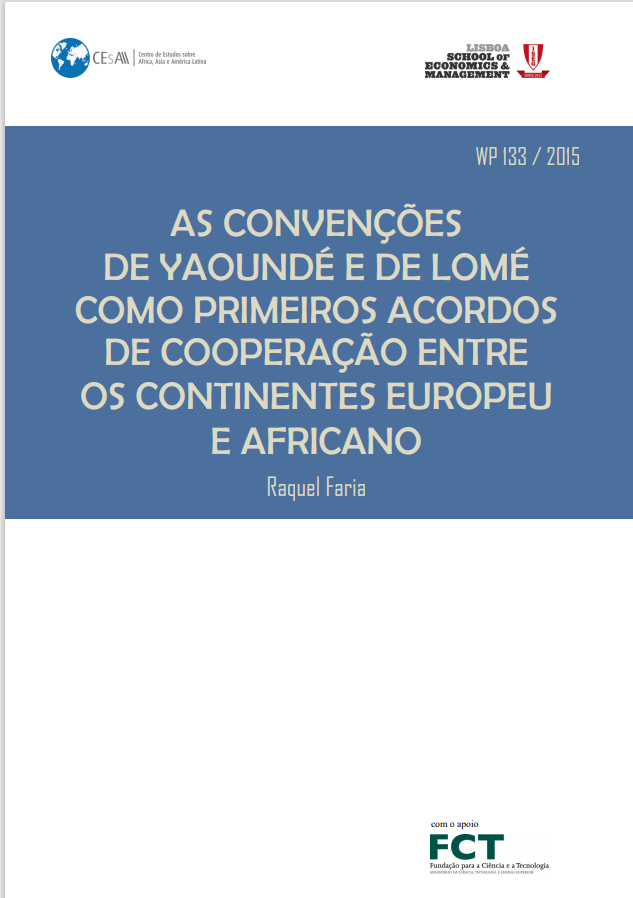
Working Paper 133/2015: As convenções de Yaoundé e de Lomé como primeiros acordos de cooperação entre os continentes europeu e africano
Abstract:
Quotation:
Faria, Raquel. 2015. “As convenções de Yaoundé e de Lomé como primeiros acordos de cooperação entre os continentes europeu e africano”. Instituto Superior de Economia e Gestão. CEsA (Centro de Estudos sobre África e Desenvolvimento) – Documentos de Trabalho nº 133/2015
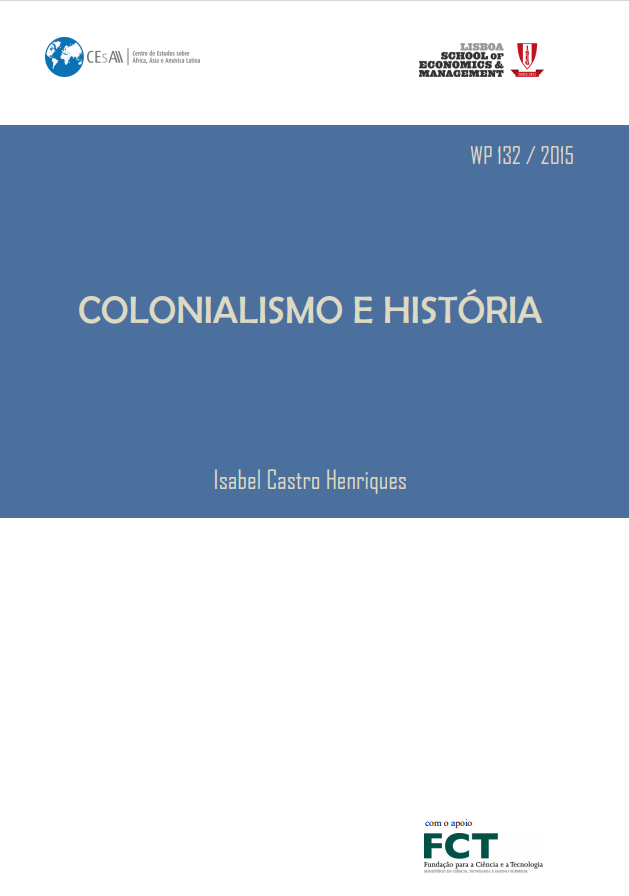
Working Paper 132/2015: Colonialismo e história
Abstract:
In Colonialismo e história we reflect on how today, in the field of world historical reflection, we are witnessing the vehemence of the reappearance of the colonial phenomenon, which has been imposing itself not only because of its nature as a ‘minority issue’, but also for the double fact that, on the one hand, it allows for rethinking in terms ‘ post-colonials’, the national identities of the colonizers and the colonized, whose emancipation went through the recovery of their own history, the affirmation of their historical identity and the preservation of their memory, and on the other hand, demanding a greater interrogative density about the politicization and the internal ideologization of History. Reflecting on the importance of the ‘democratization’ introduced by contemporary history on the stage of History, Pierre Nora (Rendez-vous de l’Histoire, 2011) highlights an evidence: world history, which is rooted in Eurocentrism, registers the tight bond between Europe /West and History, in a movement similar to the one that establishes the deep relationship between Nation and History, imposes the study of the colonial phenomenon, increasingly considered as a structuring nucleus of the processes of construction of History, of (also) Western national histories. If the articulation between History and Ideology records the way in which the history of the West or ‘Western-style’ history was the object of political and ideological manipulation, it also shows how the histories of European nations were organized and became the central axis from from which the rest of History and the World was stratified. But the study of colonialism, which highlights the hegemonic nature of the West, giving an account of the inevitability of the ideologization of the fabrication of History, reveals today the need to review the simple inscription of colonialism in the great register of national history, rewriting it in the light of the colonial phenomenon. The renewal of Portuguese historiography, from the 1840s onwards, in the wake of “the most advanced European historiographies of the time, gave rise to “a new protagonist and identity referent, the nation” (Matos, 2013) that was built based on the idea of a European racial/physical, intellectual and cultural superiority and in the organization of projects and practices, which established the scientific-cultural ingredients that allowed, in the 20th century, to materialize the hierarchy and domination of the world. Writing today about the relationship between Portuguese historiography and the colonial phenomenon that markedly marked national history in the last two centuries represents a complex task where silence and discomfort, political and ideological manipulations, documentary distortions and conceptual weaknesses intersect, which require work arduous and critical process of reorganizing a past marked by multiple prejudices, whose signs remain inscribed in contemporary Portugal.
Quotation:
Henriques, Isabel Castro .2015. “Colonialismo e história”. Instituto Superior de Economia e Gestão. CEsA – Documentos de Trabalho nº 132/2015
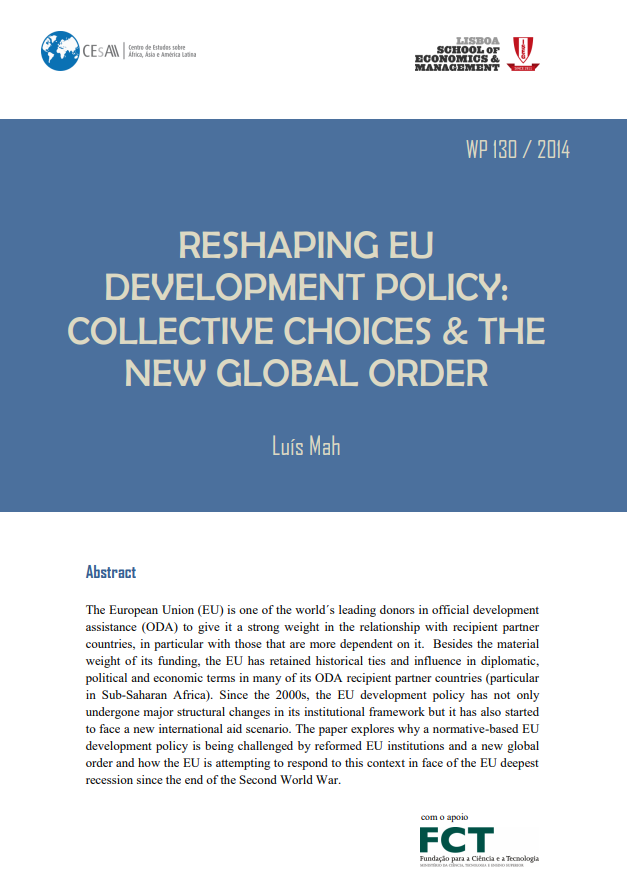
Working Paper 130/2014: Reshaping EU development policy: collective choices & the new global order
Abstract:
The European Union (EU) has built its development policy largely on the discourse of moral responsibility and solidarity (European Commission, European Parliament & European Council, 2006). This discourse is centred on the idea of a normative or ethical power, which shifts its role in the world from a positive model to a proactive promoter of ‘global public goods’. The recurrent focus of the EU is on poverty reduction and social issues, which sustains a self-portrayal as a guardian of the interests of the poor. This development policy is backed by strong financial resources and an implementation bureaucracy based in Brussels and EU delegations around the world. The EU is one of the world’s leading donors of official development assistance (ODA) to give it a strong weight in the relationship with recipient partner countries, in particular those that depend on it most. Beyond the material weight of its funding, the EU has maintained historical ties and influence in diplomatic, political and economic terms in many of its ODA recipient partner countries (especially in sub-Saharan Africa). Since the 2000s, EU development policy has not only undergone major structural changes in its institutional framework, but has also come to face a new international aid landscape. Reshaping EU development policy : collective choices & the new global order explores why a rules-based EU development policy is being challenged by reformed EU institutions and a new global order and how the EU is trying to respond to this context in the face of the deepest EU recession since the end of World War II.
Quotation:
Mah, Luís. 2014. “Reshaping EU development policy : collective choices & the new global order”. Instituto Superior de Economia e Gestão. CEsA – Documentos de Trabalho nº 130/2014.
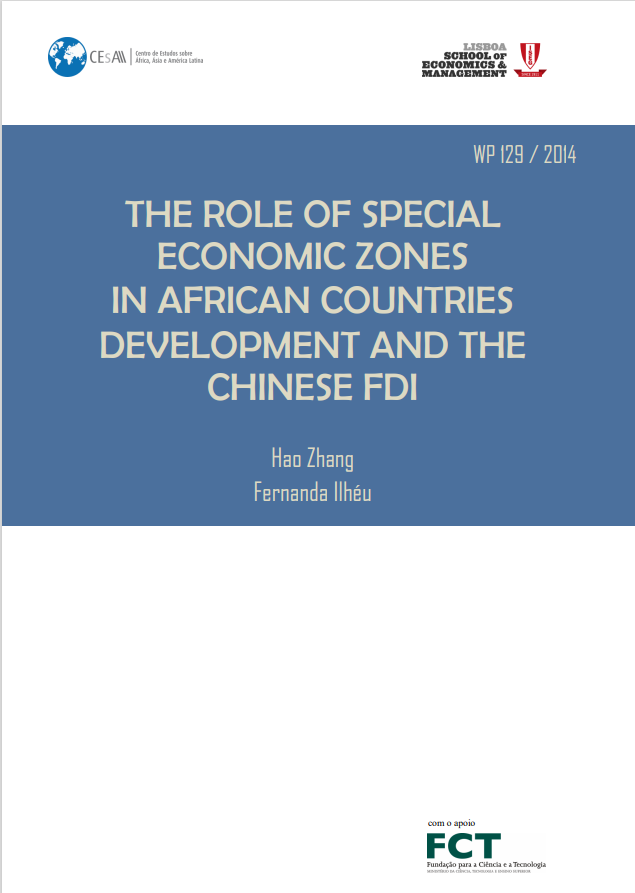
Working Paper 129/2014: The role of special economic zones in african countries development and the chinese FDI
Abstract:
In The role of special economic zones in african countries development and the chinese FDI we comment how the Chinese Government’s policy of “going out” encourages Chinese companies to pay more attention to invest in the new markets, like Latin America, especially Africa. It promotes the establishment of more and more Chinese overseas industrial and trade zones. They not only help increase demand for Chinese-made machinery and equipment, reduce investment entry and operating costs, but also assist China’s efforts to boost industrial restructuring at home and nurture companies to move up the value chain. They also provide a stage for less experienced small and medium-sized enterprises (SMEs) overseas. For the African countries, they can learn from the experience and lessons from the Special Economic Zones (SEZs)established in China. The SEZs have proved to be particularly relevant for Chinese development in the past 35 years, since they were created in 1979, they played a decisive role for development of places like Shenzhen, Zhuhai, Xiamen, Shantou, Hainan and Shanghai.
Quotation:
Hao Zhang e Fernanda Ilhéu. 2014. “The role of special economic zones in african countries development and the chinese FDI”. Instituto Superior de Economia e Gestão. CEsA – Documentos de Trabalho nº 129/2014





